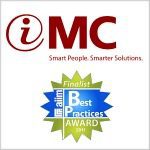
Our new series, “Millennial Mavericks: Dispelling Generational Stereotypes in the Workplace,” features emerging leaders in the government contracting industry who belong to the Millennial generation (those people born between the early 1980’s and the early 2000’s).
These young professionals face numerous stereotypes, including a sense of entitlement and laziness, none of which are desirable traits in the workplace. However, after interviewing a sample of Millennials who work at leading government contracting companies, we’re learning that those stereotypes couldn’t be more wrong.
Our next featured Millennial is Kristy Regan, a Senior Associate in Program Management at Sapient, who began her contracting career while still in college.
WashingtonExec: Please provide some background information about yourself, including your career goals.
Kristy Regan: I started my career at Sapient Government Services at 21 years old while still in college. I had had several career-focused internships in marketing and communications, advertising, and sales starting from the age of 17. I began interning for SGS full-time in the summer between my junior and senior year as a marketing and business development intern. As the internship wrapped up, I was hired as a full-time employee.
At 22 years old, I was assigned as a project manager with a nonprofit that had significant growth opportunities, and I was a key component in growing that work from a single project to a complex multi-year effort. At 23, I was staffed to lead a track of strategy work that involved being trusted to interview and lead meetings and workshops with CEOs and successful well-known entrepreneurs who created a strategy to help solve senior housing issues in the United States.
After two years of working in the world of nonprofits and foundations for Sapient Government Services, at age 24, I was asked to lead several tracks of strategy work at a large government institution. It was there that I was a trusted by internal and external senior leadership to do full program analyses and provide recommendations for efficiency to help ensure effective spending by the government.
I have won several awards within Sapient, including one for my dedication to the client and client success, and one for my ability to foster relationships. Additionally, I was a finalist for the Sapient-wide award, Rookie of the Year. In addition to my “day job”, I am also involved in several organizations and efforts both inside and outside of Sapient. I have been a strong supporter of Sapient’s Corporate Social Responsibility by dedicating my time to The Children’s Inn at NIH through volunteering to help with events and leading dinner and craft nights with the children and families of The Children’s Inn. I also dedicate hundreds of hours as a volunteer to No Greater Sacrifice (NGS), an organization that provides scholarships to the children of wounded and fallen soldiers.
My career goals include continuing to better myself and broaden my experience through new opportunities, which is why consulting is such a great place to be. I am constantly being challenged in new situations and working with new people.
WashingtonExec: What is the biggest challenge in working with professionals from different generations, and how do you meet that challenge?
Kristy Regan: With all projects that I have been on, I am often faced with this. I am almost always the youngest person on both my team and the client team. One nice thing about most people in different generations is that they have relatively low expectations of Millennials, so I am constantly able to impress people.
When I was put on a team of people I had never met before (most of whom are in a different generation), the expectations were really low. In the first week or so, I was asked to staple things and print things because they didn’t think I was capable of much more. Within a matter of three weeks, I was running my own track of work and had become the go-to person for advice and sanity checks on the team.
I guess the most telling thing here is that other generations generally come in with low expectations but are willing to change their minds should they be impressed. Millennials like myself come in with high expectations of ourselves and those around us, and we get frustrated when people don’t live up to those expectations.
WashingtonExec: What are the biggest strengths of the Millennial generation, and how do you see those strengths represented at Sapient?
Kristy Regan: In my experience, people are often shocked to find out my age, and I often get the response, “You seem so professional for being so young.” My peers and I were forced to grow up quickly as we were entering the workforce during a recession. We didn’t have time to make rookie mistakes.
Within two weeks of graduating college, I was in a room with the CEO of one of the largest nonprofits in the country and was expected to impress him.
People from other generations had a more clearly defined and hierarchical career path, while many Millennials were thrown into the deep end and expected to swim.
WashingtonExec: What “typically Millennial” characteristic do you think has served you well in your career?
Kristy Regan: Many people think Millennials don’t respect hierarchy and order. I think that while this may be true, it is because we, as a generation, have come to respect hard work and dedication instead of age and order. I don’t automatically assume someone is right and I am wrong because they are older or more experienced. I am willing to push back and ask questions, which usually just leads to a better end product. I have been very fortunate with Sapient. It is not a hierarchical company, and my managers have always been willing to listen to what I have to say.
I believe that the willingness to push back, ask questions and be heard is a Millennial characteristic that has served me well.
WashingtonExec: What can companies do to attract more talented Millennials?
Kristy Regan: I believe it is easy to attract talented Millennials to companies. As a general rule, I feel myself and my peers are more interested in the relatively low cost (to the company) perks that a company can offer. For example, a company that appreciates culture and unity by offering quarterly team outings or weekly office lunches or a company that is willing to be flexible with hours as long as the work gets done is much more attractive to me than the more typically thought of attractive things like titles, company recognition, and salary.
WashingtonExec: How do you like to spend your free time?
Kristy Regan: In my free time, you can usually find me doing one of four things: Spending time with my family, running, socializing, or volunteering.


